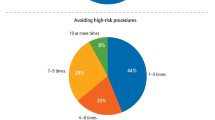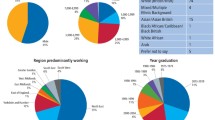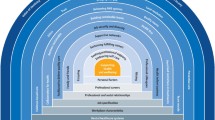Key Points
-
This paper reports on a wealth of descriptive information gathered from the first national survey in Scotland of primary care dentists declared preferences for appropriate CPD.
-
For those involved in the planning and provision of CPD this will enable more targeted delivery of education provision and more focussed studies on effective educational methods for dentists.
-
The reader has the opportunity to look at trends in preferences based mainly on age and gender, and there are many interesting differences.
-
Career pathways for primary care dentists are uninspiring at present. Suggestions for linking CPD with long term career development are explored.
Abstract
Objectives To describe the current and intended continuing professional development activity of dentists in general and community practice.
Design A cross-sectional survey by postal questionnaire.
Methods A semi-structured questionnaire was sent to all general practice and community dentists identified from the dental practices division as being in practice in Scotland. The issues addressed included personal demographics, current working patterns and job satisfaction, training and professional development and finally career and working intentions.
Results Of the 1,917 questionnaires sent to general dental practitioners (GDPs), 1,357 were returned useable (70% response rate); 212 of the 283 questionnaires to community dental practitioners (CDPs) were returned giving a 75% response rate. Of the responders, 89% of GDPs (1,188) and 95% of CDPs (178) reported participating in some form of CPD in the preceding year. One sixth of GDPs (211) and one third of CDPs (62) had a further qualification. Short courses such as Section 63 were very popular with over 90% of GDPs, but more than half the respondents did not think that further qualifications would enhance their career prospects. The most commonly identified barriers to further qualifications were heavy clinical commitments (78%), with 73% citing the substantial cost with no additional benefit. Over a third of GDPs under the age of 30 indicated they intended to sit a postgraduate qualification, but this fell to 12% for those aged over 30. The number of dentists identified on a career break was low (18).
Conclusion Two years before implementation of the General Dental Council's mandatory revalidation scheme, over 90% of Scottish primary care dentists reported active participation in continuing professional development. Future initiatives must be sufficiently sophisticated to fulfil the educational needs of different age groups, and to focus on part-time and career break dentists as well as full-time practitioners. It is important to establish career pathways in dental primary care. Part-time modular courses such as Masters degrees in primary care based dentistry may be one solution. An increased number of part-time posts for primary care dentists in secondary dental care may increase the skill base and also increase service provision in secondary care establishments. These pathways should create an opportunity to adequately reward those who continue to develop the knowledge and skills necessary for a technically demanding healthcare profession.
Similar content being viewed by others
Log in or create a free account to read this content
Gain free access to this article, as well as selected content from this journal and more on nature.com
or
References
Russell EM, Harrold T, Watson S A Scottish survey of general and community dental practitioners 2000. The toothousand project. Scottish Council for Postgraduate Medical & Dental Education March 2001.
Russell EM, Leggate M Dentists in general and community practice: a Scottish survey. Br Dent J 2002; 193: 333–337.
Kitchen S, Ashworth J Survey of GDPs' workloads: Final report. Office of Manpower Economics BMRB/JA/SK/1154–561 October 2000.
Seward M Better Opportunities for women dentists. Department of Health http://www.doh.gov.uk/betteropportunitiesforwomendentists/.
Ireland RS, Palmer NO, Bickley SR A survey of general dental practitioners' postgraduate education activity and demand for extended modular postgraduate programmes. Br Dent J 1999 187: 502–506.
Grace M Evaluating the training. Br Dent J 2001; 191: 229–230.
Scottish Council for Research in Education: Report to SCPMDE. A Bridge to the Future: An evaluation of General Professional Training for Dentistry in Scotland. 1999.
Leung WC Studying for a Master's degree [career focus]. Br Med J 2000; 323: 7312–7314 http://bmj.com/cgi/content/full/323/7312/S2-7312.
Lawrie O Report from the working group for education and training in the management of the dentally anxious patient. SCPMDE Annual Conference October 2001.
Acknowledgements
The data collection and main analyses for this project were carried out by Tracy Harrold, without whom the study would not have been completed. We are also very grateful to all the dentists in primary care in Scotland who completed the lengthy questionnaire and volunteered so many additional comments. The study was funded by the then Scottish Council for Postgraduate Medical and Dental Education, to whom we express our thanks.
Author information
Authors and Affiliations
Corresponding author
Additional information
Refereed paper
Rights and permissions
About this article
Cite this article
Leggate, M., Russell, E. Attitudes and trends of primary care dentists to continuing professional development: a report from the Scottish dental practitioners survey 2000. Br Dent J 193, 465–469 (2002). https://doi.org/10.1038/sj.bdj.4801598
Received:
Accepted:
Published:
Issue date:
DOI: https://doi.org/10.1038/sj.bdj.4801598
This article is cited by
-
Dentists’ entrepreneurial intention and associated factors in public hospitals in major cities in Guangdong (South China): a cross-sectional study
BMC Oral Health (2020)
-
Perception of studying dental law and ethics among postgraduate dental students in the UK
British Dental Journal (2015)
-
An investigation into the participation and attitudes of dental technicians in Wales towards continuing professional development
Vital (2010)
-
Occupational burnout and work engagement: a national survey of dentists in the United Kingdom
British Dental Journal (2008)
-
The impact of course attendance on the practice of dentists
British Dental Journal (2004)



